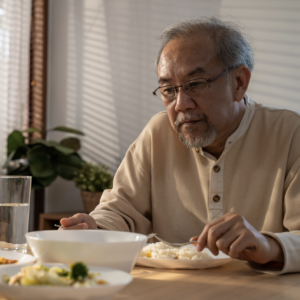Aging Solo: Planning For Aging On Your Own

Aging Solo: Planning For Aging On Your Own
October 26, 2023
A recent national survey of older adults living alone, conducted by AARP, found both good and not-so-good news when it comes to seniors aging “solo.” About 10% of the US population over age 50 are “solo agers” and for women over age 75, that number jumps to 42%. It’s a number that’s increasingly growing, as people live longer (and potentially become widowed), close family members live apart and divorce among the over-50 population continues to rise. There’s also an increasing number of adults who never married at all, and as a result, live alone into their later years. The good news is that being alone does not necessarily equate with being socially isolated or lonely. The AARP survey found that many older adults in this situation prized their freedom to do as they wanted. However, loneliness and social isolation can be issues for solo seniors, and there are health, financial, and decision-making implications of doing everything without close family support or companionship.
Consider some recent research regarding the health implications of being on your own. A study published in August in JAMA Network Open addressed concerns about living alone when a person has cognitive decline. Aging alone while dealing with deteriorating cognition can become a serious barrier to getting necessary care and maintaining health and well-being. The data suggest that 1 in 4 older adults with dementia or cognitive impairment lives alone and are thus at risk for missing physician appointments, having medication problems, experiencing malnutrition or self-neglect, and being a fall risk. In fact, the researchers state that living alone is a “social determinant of health,” on par with poverty, racism, and low education.” Another recent study looked at cancer patients who live alone and found that those who live alone may face a higher risk of death compared to cancer patients who live with others. While more research needs to be done to examine the association between living alone and cancer deaths, it could be that social isolation from living alone, leading to poor health habits and psychological distress, may play a role. For more on this study, click here and here.
One thing becomes crystal clear: For older adults aging alone, the necessity to plan in advance before physical or cognitive decline sets in is critical. It’s obvious that being on one’s own and experiencing serious health problems can leave you anxious and apprehensive about what could happen to you. While you can’t always predict whether you will wind up being a solo ager, once that course becomes clear it’s necessary for you to set up a network of supports and surrogate decision-makers to stay healthy, independent, and engaged as long as possible. That may include help from professionals for your finances and determining who in your community of friends and neighbors you can call on and empower when and if the going gets rough. The previously referenced AARP study suggests that many solo older adults have not yet put in place the legal and health care documents essential to allowing others to help you if you’re alone and unable to take care of your affairs. For a comprehensive guide on these legal, medical, and emotional concerns, dial up a friend and read here.







